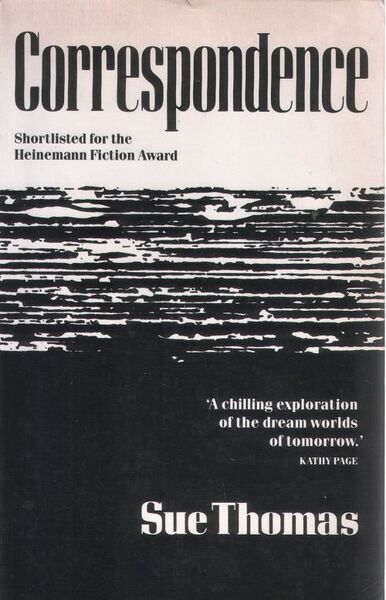Maybe Make Believe
Correspondence
By Sue Thomas

24 Apr, 2025
Sue Thomas’ 1992 Correspondence is a stand-alone science fiction novel.
All of the modern world’s wonders cannot protect one from loss and grief. A single moment can erase spouse and children. However, those wonders do offer a solution.
Two solutions, in fact.
Losing husband and children is a terrible blow. Millions of years of evolution favored entities who felt attachment to mates and offspring. Nature and flesh prompt incapacitating grief over the loss of kin.
Technology cannot revive the dead. Technology can do something about the flesh. Pare away flesh, bone, and most importantly, the glands that drive emotional responses. Transform that grieving widow into a flawless machine, step-by-step, and surely at some point the scalpel will remove grief as well.
True, the fully fleshed don’t seem to care for increasingly prosthetic persons. Rejection could be painful… for those who feel.
The same trauma that compels the widow to transform herself drives creativity. Persons like the widow are ideal compositors, weaving compelling interactive fictions online for mass delectation. No surprise the widow’s creation is so compelling.
Rosa is the widow’s ideal person, an earth-mother figure living in nature. However, the compositor is plagued by an intrusive thought or rather an intrusive character, Shirley. Even writers cannot always control their fictions.
Shirley is Rosa’s friend. Although she is in many ways Rosa’s anthesis, Shirley could become closer than a friend. Short-sighted audiences might see this as a delightful development. The prudent would point out attachment ensures loss. This is as true for authors as it is friends.
The only question is in what form loss will come.
~oOo~
Usually, these reviews start with warnings and critiques. Instead, have a reassurance. Yes, the author is British, and yes, this is Thatcher-era near-future SF, and yes, the plot is kicked into action by tragic loss. Counterintuitively, those do not mean entropy always wins, or that hope is always punished. The elements of the book might sound like the result has to be a giant downer. It isn’t.
The events do not support the hypothesis that transforming oneself into an unfeeling, alienated machine is the optimum grief-management strategy or even one that is particularly effective. One might go so far as to say the book makes the case that this approach is futile.
The word “cyborg” does not appear in this text because, as the introduction makes clear, the author had not yet encountered that term when she wrote this novel. For that matter, the author hadn’t encountered the term “multimedia” — had it been coined yet? — although she inserted that term in a later edition.
All of the widow’s story is written in the second person by a narrator whose identity is unclear to me.
Until I posted a Clarke Award Poll, I’d managed to miss this novel. As I tend to enjoy Clarke Award nominees, and since Correspondence is both short and in print, it seemed a no-brainer to hunt it down.
More erudite reviewers would focus on Thomas’ narrative structure, divided between widow and her creations, with ancillary material ranging from reader guide comments to quotations from relevant non-fiction pieces. Alas, I never think to mention that aspect of the SF I read. Pity, because the author’s decisions in this matter are bold.
Correspondence was an enthralling read. The fact I got invested in the fate of characters two-fold fictional was remarkable. The only downside to having discovered the author is the subsequent discovery that Thomas’ body of SF is this novel, the novel Water, the Wild Women anthology, and three short stories. I don’t imagine it will take me long to complete my collection or to read it all. Ah, well.
Correspondence is available here (SF Gateway), here (Barnes & Noble), here (Bookshop US), here (Kobo), and here (Words Worth Books).
I did not find Correspondence at either Bookshop UK or at Chapters-Indigo. Given that the publisher is British, I am surprised by the first.
This is where USA delenda est usually goes but the US is almost entirely irrelevant to this novel.
